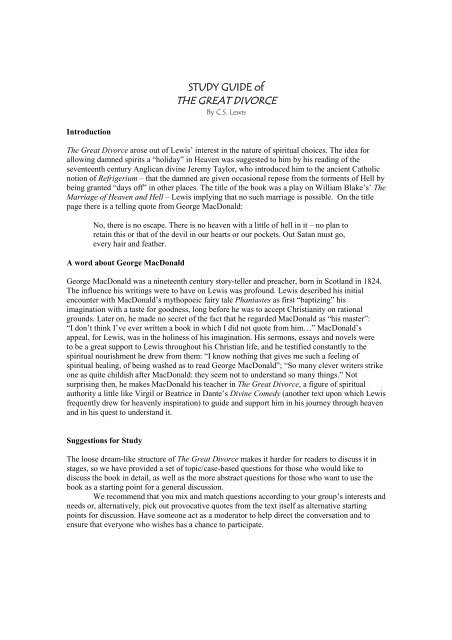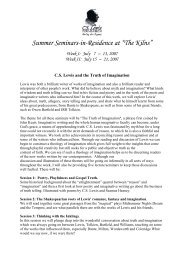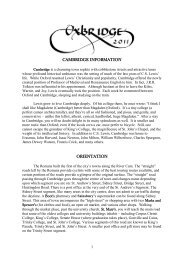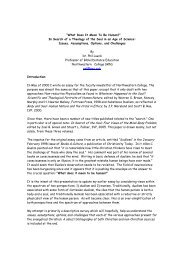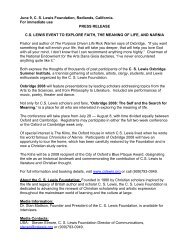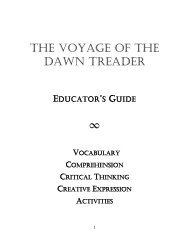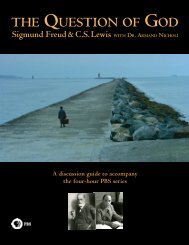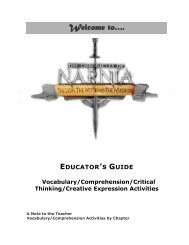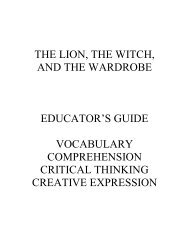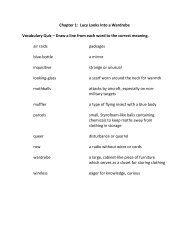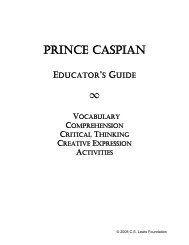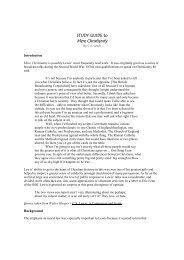Study Guide to The Great Divorce - CS Lewis Foundation
Study Guide to The Great Divorce - CS Lewis Foundation
Study Guide to The Great Divorce - CS Lewis Foundation
You also want an ePaper? Increase the reach of your titles
YUMPU automatically turns print PDFs into web optimized ePapers that Google loves.
<strong>The</strong>re are only two kinds of people in the end…Case-Based QuestionsAll the conversations in <strong>The</strong> <strong>Great</strong> <strong>Divorce</strong> are aimed at unearthing the deceptions with whichdamned humanity defends its refusal of God. You might like <strong>to</strong> pick out a few cases of such selfdeceptionin the individual portraits of the ghosts, looking at how they justify their choices.Working through their examples, contrast what they say with what, <strong>Lewis</strong> suggests, are theunspoken crises of the will behind their choices (fear of humbling themselves, wanting <strong>to</strong> remainin control, possessiveness over others, etc). Here are a few questions <strong>to</strong> get you started:<strong>Lewis</strong>’ Picture of Heaven(1) Discuss the imagery of <strong>Lewis</strong>’ heaven, and what it might have been intended <strong>to</strong> signify.Consider <strong>Lewis</strong>’ use of :(a)(b)(c)(d)(e)(f)Rock-hard and “unbreakable” heavenly matter“Size- travel” – changing perceptual dimensions by getting larger or smallerNatural imagery, such as trees, rivers and mountainsNon-human presences such as lions, giants, angels, and unicorns<strong>The</strong> ‘double vision’ with which the narra<strong>to</strong>r sees the heavenly characters<strong>The</strong>ir ‘agelessness’(2) How does <strong>Lewis</strong> present questions of time and reality in heaven?<strong>Lewis</strong>’ Picture of Hell(3) Is there any relationship between traditional notions of hell and the kind of hell that <strong>Lewis</strong>depicts?(4) What sort of society could one expect <strong>to</strong> get in <strong>Lewis</strong>’ hell?<strong>The</strong> Tousle-Headed Poet: “He appeared <strong>to</strong> be a singularly ill-used man”(5) How is the Poet deceiving himself?<strong>The</strong> “Big Man”: “Ask for the Bleeding Charity”(6) What is the Big Man’s concept of “decency”?(7) What prevents him from staying in heaven?<strong>The</strong> Bishop: “It all turns on what are honest opinions.”(8) Why has the clerical ghost become an apostate?(9) What does the solid spirit recommend as the cure?<strong>The</strong> Hard-Bitten Ghost: “they won’t catch me that way.”(10) Do you think the Hard Bitten Ghost is overly cynical?(11) Can cynicism be dangerous?© C.S. <strong>Lewis</strong> <strong>Foundation</strong>, 2001 2
<strong>The</strong>re are only two kinds of people in the end…<strong>The</strong> Frightened Ghost: “You’ve no right <strong>to</strong> ask me <strong>to</strong> do a thing like that.”(12) What is the ghost frightened of?(13) What was the purpose of the final “expedient”?<strong>The</strong> Grumbling Ghost: “going on forever like a machine.”(14) Do you think MacDonald is <strong>to</strong>o severe in his judgment of grumbling?<strong>The</strong> Painter: “one becomes more and more interested in paint for it’s own sake.”(15) How had the Painter lost his first love?Robert’s Wife: “it was all for his own good in the end.”(16) What, does <strong>Lewis</strong> suggest, was the real motive behind Robert’s “treatment”?Pam: “no natural feelings are high or low, holy or unholy, in themselves.”(17) Do you agree with MacDonald that “love, as mortals understand the word, isn’t enough”?(18) What do you think Pam’s case was designed <strong>to</strong> illustrate?<strong>The</strong> Ghost with the Lizard: “It would be better <strong>to</strong> be dead than live with this creature.”(19) What was the nature of this ghost’s struggle?(20) How did he finally break free?(21) What were the consequences of his choice?Sarah Smith and the Dwarf-Ghost: “Our light can swallow up your darkness: but your darknesscannot now infect our light.”(22) What was the relationship between the Dwarf-Ghost and the Tragedian?(23) In what ways can people be divided within themselves? What are the dangers of acting a partwith others?(24) “Is it really <strong>to</strong>lerable that she should be un<strong>to</strong>uched by his misery….” How does MacDonaldexplain Sarah’s reaction?(25) What distinction is made, in this section, between the action and the passion of pity?(26) How is pity for others different than pity for oneself? What dangers are inherent in the latter?(27) According <strong>to</strong> MacDonald’s reasoning, why was Jesus able <strong>to</strong> descend in<strong>to</strong> hell?© C.S. <strong>Lewis</strong> <strong>Foundation</strong>, 2001 3
<strong>The</strong>re are only two kinds of people in the end…<strong>The</strong> picture of the chessmen: “the picture is a symbol: but it’s truer than any philosophicaltheorem.”(28) What do you think the picture was intended <strong>to</strong> signify?General Questions(1) What do you think <strong>Lewis</strong> is saying, in this book, about the relationship between good andevil?(2) Writing in a letter <strong>to</strong> his brother in 1940, <strong>Lewis</strong> said: “I begin <strong>to</strong> suspect that the world isdivided not only in<strong>to</strong> the happy and unhappy, but in<strong>to</strong> those who like happiness and thosewho, odd as it seems, really don’t.” Do you think this is a good insight in<strong>to</strong> the spiritualchoice we make for or against God? Is it really that simple?(3) “Better <strong>to</strong> reign in Hell than serve in Heaven.” Why, in <strong>Lewis</strong>’ view, do people reject God?(4) “Because the Middle Ages erred in one direction, does it follow that there is no error in theopposite direction?” Discuss <strong>Lewis</strong>’ portrait of liberalized Christianity.(5) <strong>Lewis</strong> has one of his characters describe God as the Eternal Fact. Do you think that’s a gooddescription?(6) “I believe, <strong>to</strong> be sure, that any man who reaches Heaven will find that what he abandoned…has not been lost.” Do you believe this as well?(7) “…mortals misunderstand. <strong>The</strong>y say of some temporal suffering “No future bliss can makeup for it” not knowing that Heaven, once attained, will work backwards and turn even thatagony in<strong>to</strong> a glory.” Do you agree with <strong>Lewis</strong> that the eternal future sets the past in context?Have you ever felt heaven “working backwards” in your own life?”(8) “Hell is a state of mind…” What are the characteristics of the Hellish mindset? How can weguard against them?(9) “Those that hate goodness are sometimes nearer [heaven] than those who know nothing aboutit.” Do you think there is some truth in this? Can you think of any real-life examples?(10) “Every natural love will rise again and live forever in this country: but none will rise againuntil it has been buried.” How are we asked <strong>to</strong> “bury” the natural loves?(11) “I know it has a grand sound <strong>to</strong> say ye’ll accept no salvation which leaves even one creaturein the dark outside. But watch that sophistry or you’ll make a Dog in a Manger the tyrant ofthe universe.” Do you accept MacDonald’s explanation of why people are allowed <strong>to</strong> choosehell?(12) “Ye cannot know eternal reality by a definition.” Discuss this statement.(13) If you drew one lesson from your reading of <strong>The</strong> <strong>Great</strong> <strong>Divorce</strong>, what would it be?© C.S. <strong>Lewis</strong> <strong>Foundation</strong>, 2001 4


